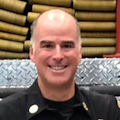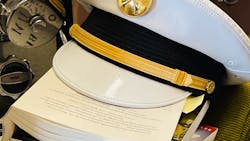George C. Scott won the Academy Award for Best Actor portraying Gen. George S. Patton in the 1971 film “Patton.” A sequence in the movie highlights Patton’s victory over German Field Marshal Erwin Rommel’s Afrika Korps. At the end of the sequence, with the Germans retreating, a smiling Patton exclaims, “Rommel, you magnificent bastard. I read your book!”
Leadership, in many ways, is enigmatic. Pinpointing a specific trait or traits can be difficult at best. However, one thing is certain: If you want to be a successful leader, reading is indispensable to achieving your goal. Quite simply, if you don’t read, you can’t lead.
Whether you embrace it or not, chief officers are leaders. Although company officers are the key to carrying out a department’s mission, chief officers define their department’s direction. Subordinates compare chief officers’ actions to their words. Chief officers’ actions are examined, dissected and frequently questioned. That gulf between the silver and gold badges is closed through chief officers’ leadership skills or widened by the lack thereof.
Aiding during COVID-19
There are many ways to develop leadership. One indisputable place to learn and to evolve as a leader is within the pages of books. Wildland safety? Sadly, history is replete with after-action reports (AARs) on deaths and near-misses. Just read them.
Whenever I sit down to read “Young Men and Fire” by Norman Maclean, I am reminded that the challenges that are faced by the smokejumpers haven’t changed. Analyzing that text, side-by-side with available AARs, the same strategic and tactical errors occur today as they did before in the areas of weather and topography, communication and leadership. I studied those issues, personalized them, made them my own, and I pray that I am not the one who forgets them.
Leadership in times of crisis? This past year has challenged the fire service and its leaders in unimaginable ways. I found myself returning to “Duty: Memoirs of a Secretary at War” by Robert M. Gates, who was Secretary of Defense under George W. Bush and Barack Obama. Gates managed conflicts in Iraq and Afghanistan, along with his other responsibilities. The insights from Gates as to how to lead my battalion through the pandemic were crucial.
Learn about others—and yourself
Reading is learning. Chief officers can’t and shouldn’t stop learning. Whether newly promoted or preparing to retire, they must learn continually, not only how to do their job but how to do it better. Moreover, chief officers possess a sacred obligation to those who they command to do better by learning more. Reading teaches leadership, tactics, strategies.
My goal when reading isn’t only to learn from others but to learn about myself, because reading reveals the good, bad and otherwise of ourselves as people and as chief officers.
Reading also teaches critical analysis skills and the ability to apply the lessons that are garnered from such analysis. Some of you who are reading this now will be deputy chiefs in the future—perhaps even a fire chief. Maybe you will move onto some other department. Any individual who is in a leadership role must possess the capacity of critical thought. Reading is one means to that end. Ask any of your current bosses or your current fire chief.
Critical analysis shouldn’t be limited to upper management positions. As chief officers, particularly battalion chiefs, analytical thinking is essential, particularly on the fireground. Decisions on the fireground are made rapidly, often with little or no input. An ability to analyze and process information swiftly has significant ramifications. Again, reading teaches this.
If your department is anything like mine—and I wouldn’t be surprised that it is in many ways—there is a widespread belief that one must work at busy assignments to gain the experience and acumen to promote. Experience is how you grow as a leader; it is the coin-of-the-realm for successful fireground operations. That said, experience is but one piece of the puzzle: Exceptional leadership is more than experience. Without viewing that experience in the hard light of history, as written by those who lived it—on the battlefield, in the boardroom and elsewhere—you are limited. In today’s environment, limitation is a recipe for disaster.
Making future chiefs
Senior military commanders publish annual reading lists. There is a mandate that officers select and read a given number of titles.
Following that tradition, last year, the Los Angeles Fire Department (LAFD) Emergency Operations Commander published a recommended reading list. The books on that list deal with leadership in various disciplines: business, academia, the military and the fire service. I read many of them. There are practical and important lessons to be applied to our roles within the fire service. This isn’t to say that I am the be-all and end-all of leaders. I have yet to meet that person. However, one thing that I learned, one lesson that every one of us must remember, is this: The more that I learn, the less that I know.
Five years from now, it’s estimated that the majority of chief officers in the LAFD will be newly appointed. Some estimates place that number at 60 percent. Is this the future of your department? It’s incumbent on current chiefs to ensure the success of their future counterparts. As such, you must look to your captains and drivers and, yes, firefighters, because in them lies the future. You must model the behaviors for success—one of which is reading.
Two questions that you must ask are: What does my department’s future look like, and how do I affect that future? In a world in which many firefighters simply don’t and won’t gain abundant fireground experience, one answer is reading.
Former Secretary of Defense James Mattis might have put it best: “By reading, you learn through others’ experiences, generally a better way to do business, especially in our line of work where the consequences of incompetence are so final for young men.”
About the Author

Jim Ruiz
Jim Ruiz has been a member of the Los Angeles Fire Department for 34 years. During this time, he held the ranks of paramedic, firefighter/paramedic, captain and battalion chief. Ruiz worked in a variety of field and administrative assignments throughout his career. His current assignment is in the northwestern region of Los Angeles. Ruiz holds a Bachelor of Arts in liberal arts and a Master of Arts in theology.
